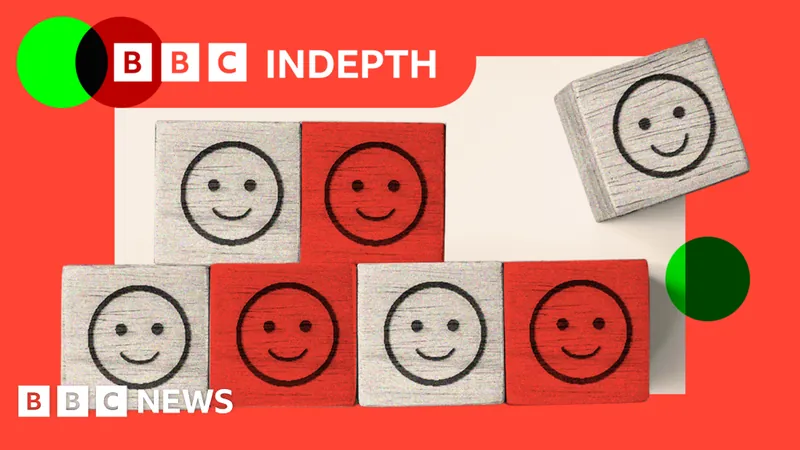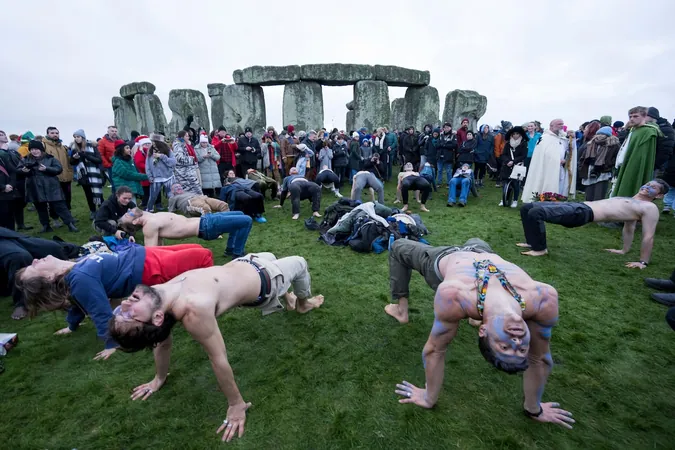
Unlocking Happiness: How Speedcubing Can Transform Your Life
2024-12-26
Author: Michael
Introduction
In an unexpected fusion of nostalgia and modern competitiveness, a massive gathering in Coventry, England, recently showcased the quirky yet exhilarating world of speedcubing—the art of solving Rubik's Cube puzzles at lightning speed. This event, the Rubik’s UK Championship, brought together enthusiasts from around the globe, including attendees from as far away as Mongolia and Canada, uniting them in a shared passion that dates back to the 1980s.
The Championship Experience
Amid a bustling arena that has hosted some of the biggest names in music, hundreds of competitors took to the tables over three exhilarating days. With 15 unique events, participants demonstrated their skills in various categories, including blindfolded and one-handed challenges. Notably, teenager James Alonso clinched victory in the most prestigious category, solving the classic 3x3 cube with a staggering average time of just 6.3 seconds.
The Evolution of Speedcubing
Originally crafted by Ernő Rubik in 1974 as a teaching tool for his architecture students, the Rubik's Cube has evolved into a cultural phenomenon. Max Park currently holds the world record for solving the 3x3 cube in a mere 3.13 seconds. As speedcubing's popularity surges, global sales of Rubik’s Cube-related products soared to $86.6 million in 2023, reflecting a 13.5% increase from the previous year.
Psychological Benefits of Speedcubing
But beyond the thrill of competition, recent studies have put a spotlight on the psychological benefits of speedcubing. Polina Beloborodova, a research associate at the University of Wisconsin-Madison, points out that the combination of cognitive challenges and social interactions in speedcubing fosters a remarkable sense of happiness. 'Engaging with the cube satisfies essential psychological needs,' she asserts, highlighting the benefits of improved problem-solving, memory, and motor skills.
Emotional Highs and Flow State
Experts note that the emotional highs experienced during cubing—ranging from awe to the sheer joy of achieving remarkable patterns—are essential components of happiness. Dr. Julia Christensen, a senior research fellow at the Max Planck Institute, emphasizes the aesthetic emotions that can occur in solving the cube, creating a transformative and elating experience.
Community and Connection
Many speedcubers report entering a tranquil state known as 'flow,' where their skills align perfectly with the activity’s demands, leading to an almost meditative sensation. This state not only heightens focus but has also been shown to correlate with improved mental health and well-being, as Dr. Christensen points out—those who frequently experience flow tend to enjoy enhanced life satisfaction.
Community plays a crucial role in enhancing these benefits. For instance, Jan Hammer, who began speedcubing at 44, credits his daughter for sparking his interest in the hobby. Their shared enthusiasm has strengthened their bond and kept him committed to the practice. 'It’s about the mutual encouragement and being part of a community,' Hammer shares, illustrating how social connections elevate the experience.
Universal Appeal of Speedcubing
Despite its predominantly male demographic—220,000 men have competed compared to just 24,000 women—speedcubing has a universal appeal that offers a unique sense of purpose. It fosters a sense of achievement and belonging, instilling eudemonic happiness through dedication and community engagement.
Cognitive Function and Escapism
But what does speedcubing do for the brain? While it undoubtedly stimulates cognitive functions during the challenge, experts warn against overestimating its long-term benefits on memory or overall brain power. Dr. Toby Wise explains that while the brain creates memories for different cube configurations, these puzzles don’t necessarily enhance cognitive function or stave off cognitive decline as some have believed.
Instead, speedcubing can provide essential escapism in today’s fast-paced world, offering a clear, achievable goal. 'It sharpens my focus,' says Hammer, who uses the cube as a mental warm-up before meetings. The satisfaction derived from transitioning a chaotic puzzle into a structured order addresses a deep-seated human need for control amid an unpredictable world.
Conclusion
In conclusion, speedcubing is more than a mere pastime; it's a multifaceted hobby that not only hones cognitive skills but also cultivates happiness through community engagement and a fulfilling sense of accomplishment. So, pick up a cube today—you might just find joy and connection while you’re at it!









 Brasil (PT)
Brasil (PT)
 Canada (EN)
Canada (EN)
 Chile (ES)
Chile (ES)
 España (ES)
España (ES)
 France (FR)
France (FR)
 Hong Kong (EN)
Hong Kong (EN)
 Italia (IT)
Italia (IT)
 日本 (JA)
日本 (JA)
 Magyarország (HU)
Magyarország (HU)
 Norge (NO)
Norge (NO)
 Polska (PL)
Polska (PL)
 Schweiz (DE)
Schweiz (DE)
 Singapore (EN)
Singapore (EN)
 Sverige (SV)
Sverige (SV)
 Suomi (FI)
Suomi (FI)
 Türkiye (TR)
Türkiye (TR)